How to wash bath towels - keep them fresh, featherlike and 5-star standard after every wash
Ensure bath towels are always soft and fluffy with these easy steps
Katie Sims
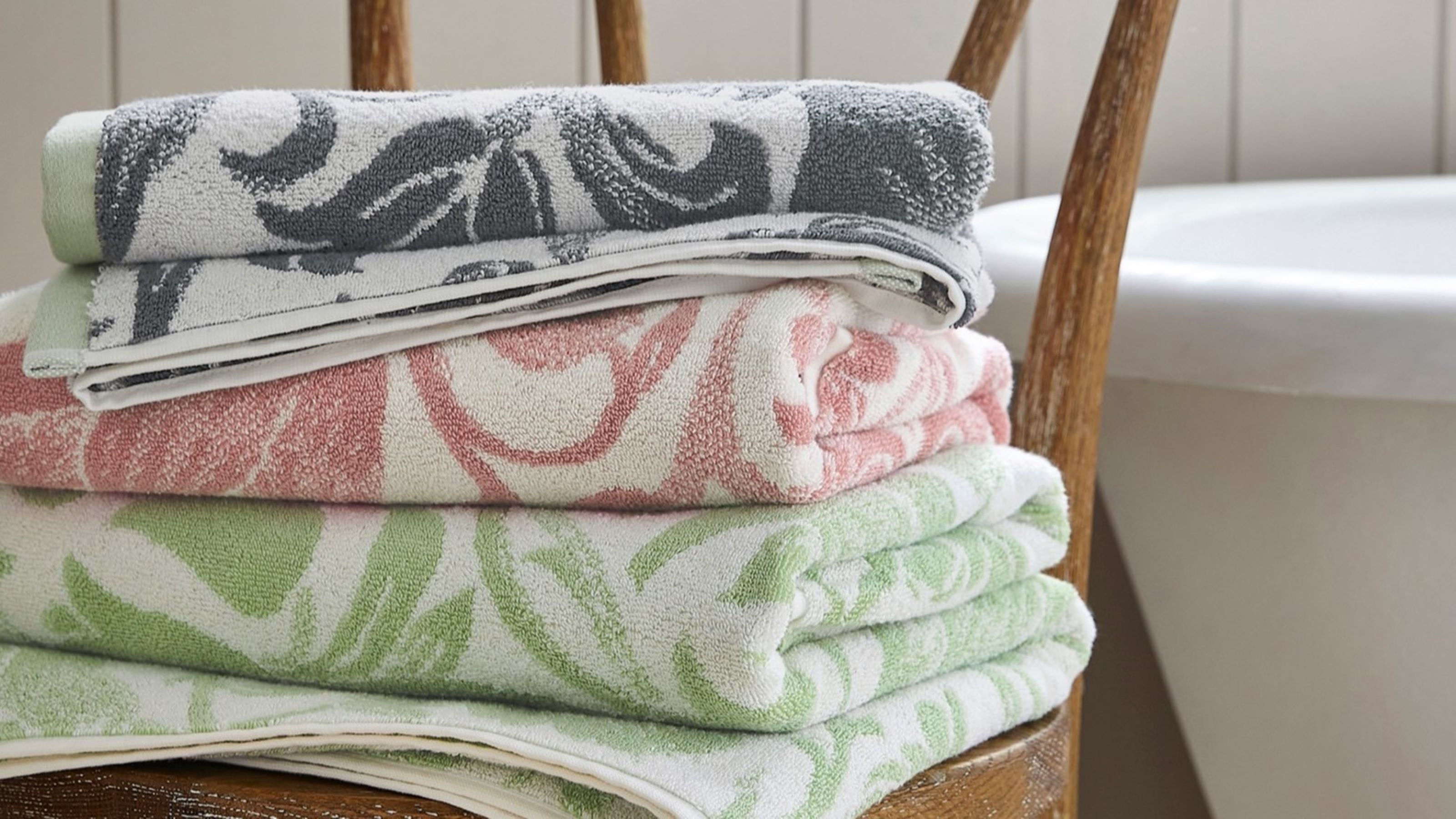
Sign up to our newsletter for style inspiration, real homes, project and garden advice and shopping know-how
You are now subscribed
Your newsletter sign-up was successful
Drying ourselves with a gorgeously soft bath towel is one of the little luxuries to enjoy at the end (or start) of every day. What's not so luxurious is using a towel that feels hard enough to crack after a hot shower or soak - if you've experienced this lately, it's time to learn how to wash bath towels the right way.
The best bath towels have specific laundry requirements, and it's important to know what these are if we want to maintain their softness for as long as possible. There are a few components to consider, including choosing the right detergent, selecting the correct cycle, and storing towels correctly afterwards.
Once you know how to wash bath towels properly, you'll be able to keep towels fresh between uses as well. We've spoken to cleaning and laundry experts to get all their top tips on bath towel care, so you can keep yours fresh and feather-like for years to come.
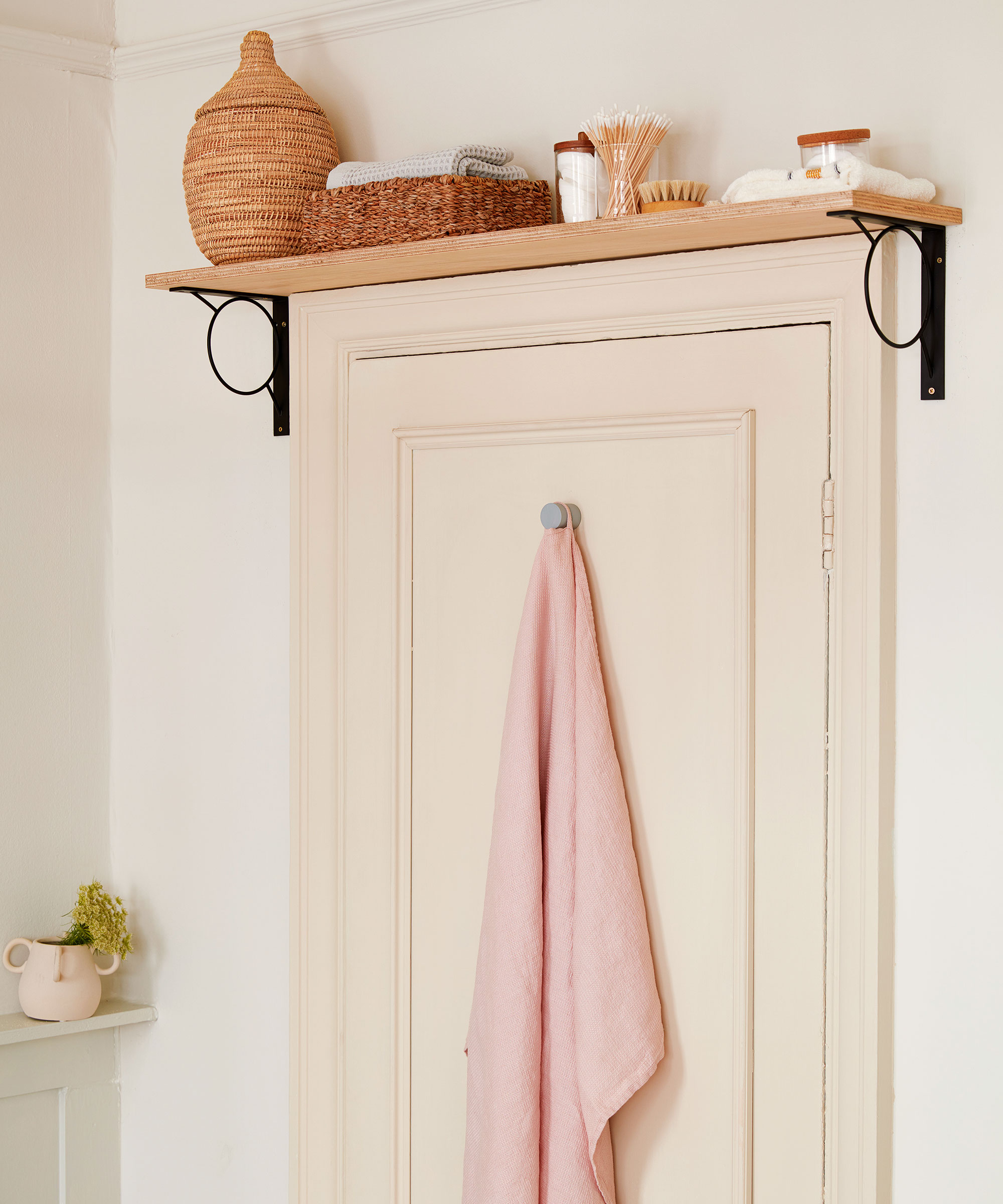
What you need
- Towels
- A washing machine
- Laundry detergent, such as the Persil Non Bio Liquid Detergent (ideal for towels as it's formulated to be nice and gentle)
- White vinegar (optional) - if you need to stock up, you can get a 5L bottle for £5.99 on Amazon
- Baking soda (optional), like this pack of 2 for £5.39
- Tea tree oil (optional) - we love the Handcraft Blends Tea Tree Essential Oil
- A tennis ball or tumble dryer balls (optional), such as this Pack of 4 Organic Laundry Balls, £7.99 from Amazon
1. Wash once a week
Knowing how often to wash your towels is the first step to maintaining their softness. The experts advise once a week for the average bathroom setting.
'I’d always say to base how frequently you clean an item like this on your specific household and usage,' Rikki Fothergill, bathroom expert at Big Bathroom Shop says. 'Whilst once a week is recommended, if you live alone or in a quiet footfall household two weeks should be enough to keep your bath towel looking and smelling fresh.'
But, Rikki says you might need to up the frequency at this time of year. 'As we head into winter, it’s important to note that with increased humidity levels that you may want to wash more often than usual to avoid build-up of mould.'
For best practise, try sticking to once a week to keep your bath towels fresh.
Sign up to our newsletter for style inspiration, real homes, project and garden advice and shopping know-how
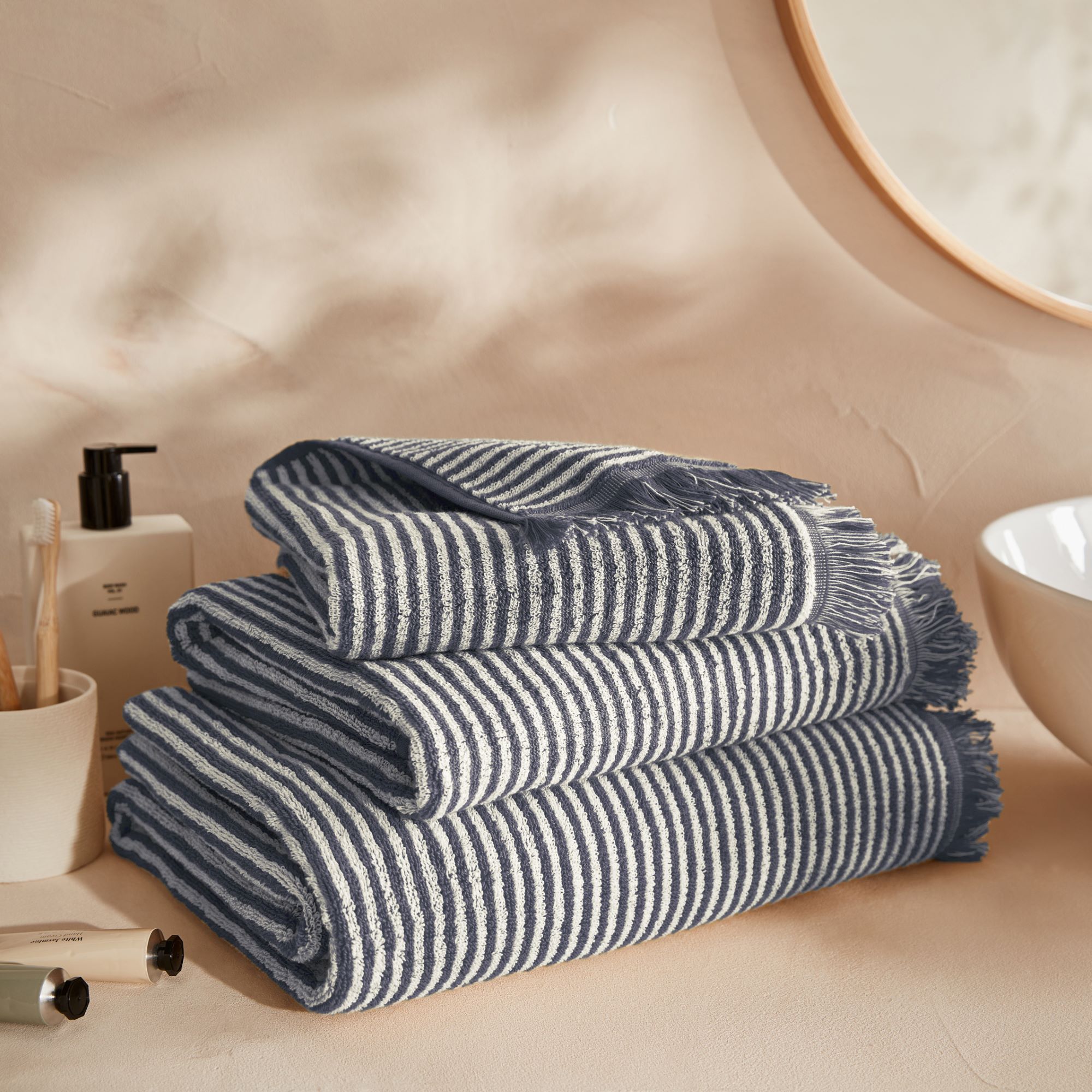
2. Separate linens
As bath sheets are large and bulky, the best practice is to wash them in an isolated washing machine load.
First, separate the fabrics into light and dark to avoid colour running. 'Begin by sorting your towels based on colour to prevent any potential colour bleeding during the wash,' explains Gwilym Snook from the heated laundry department at AO.
'Also, sort your towels based on fabric type, as different fabrics may require specific care.'
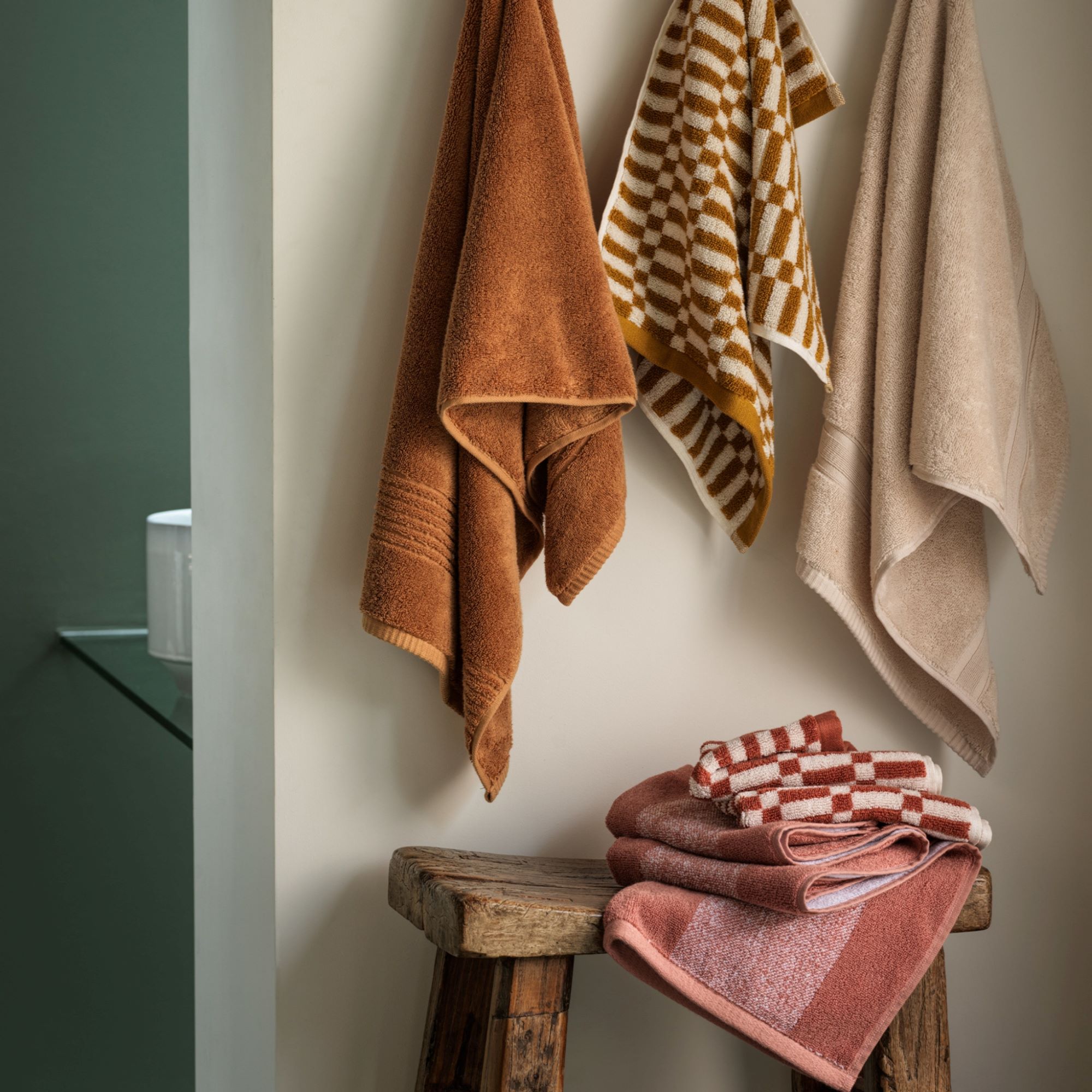
3. Pre-treat stains
Experts advise that bath towels should be machine washed on a gentle cycle to prolong their quality, so it's wise to pre-treat any stains first. Look for any obvious marks that need eliminating and spot soak with laundry detergent - we've found one of the best cleaning products for stain removal to be Ecovers liquid stain removal, available on Amazon or Vanish, available at most supermarkets. They both work a treat.
'Apply a small amount of detergent directly onto the stain, gently rub it in, and let it sit for a few minutes,' Baqir Khan, cleaning expert and owner of Proactive Cleaners advises.
'Always avoid using detergents or stain removers containing optical brighteners or bleach as these may leave marks on your towel', add Emily and Jonathan Attwood, Founders of Scooms.
4. Load the washing machine
Loading a washing machine for a towel wash may seem self-explanatory, but a vital tip when knowing how to wash bath towels is not to overfill the drum. Aside from not cleaning your towels properly, overloading will lead to problems with your machine (we'd all rather avoid fixing a noisy washing machine if possible).

'One tip that's good for every wash, including towels, is to never overfill the washing machine load,' says Victoria Bennion, Head of Category (MDA) at Curry's.
'This allows them to have enough room to wash thoroughly, and ensures the spin function works properly to remove excess water, allowing the towels to dry quicker post wash.'
5. Add detergent
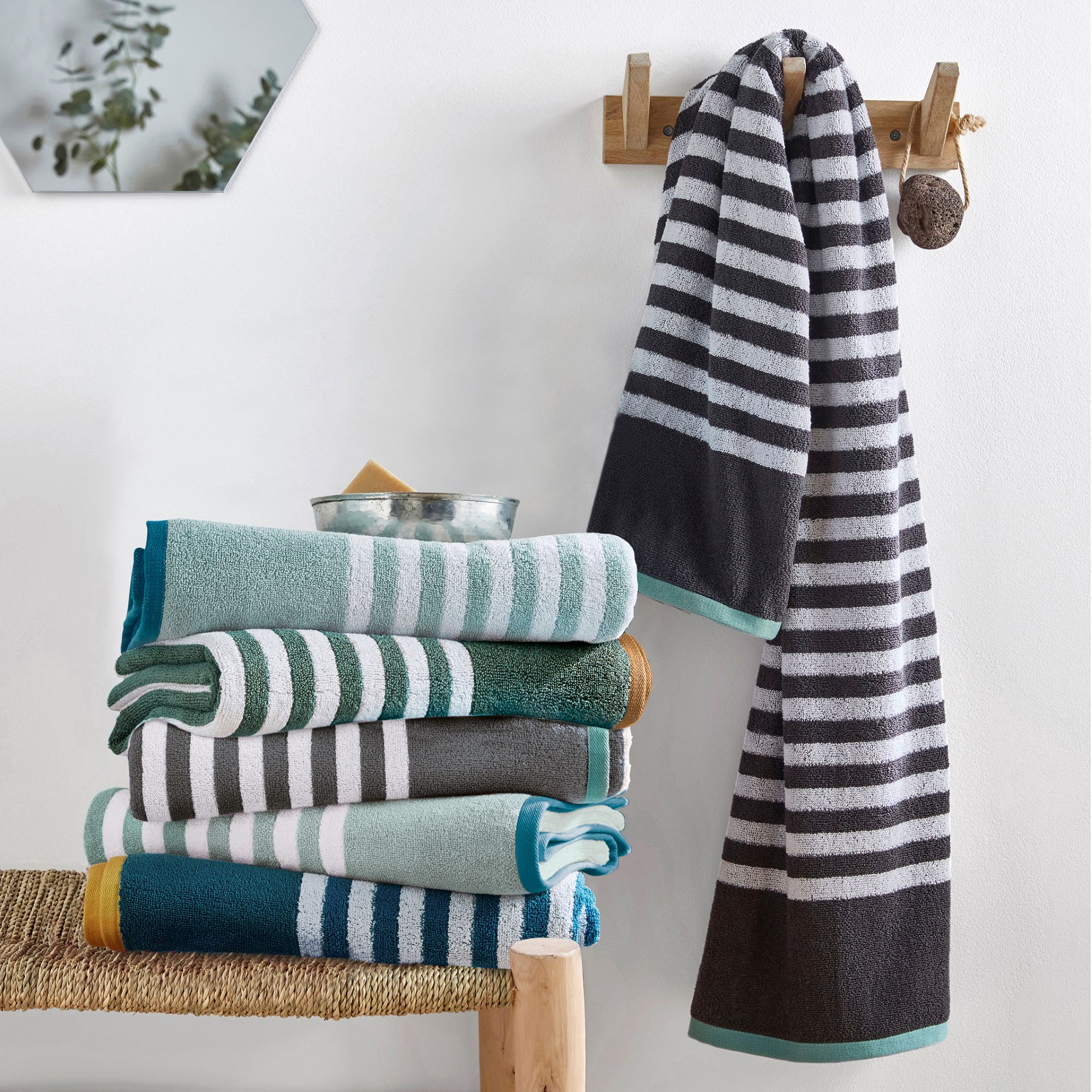
When washing towels with detergent, less is more. Too much can lead to soap and sud residue build-up that increases the chance of bacteria.
Sophie Lane, Product Training Manager at Miele GB says, 'Towels are not as dirty as you might think, as they are usually used to dry “clean” people, so always use less detergent than suggested.
'To keep towels soft, make sure that all detergent is rinsed away to make sure no soap or residue is left in the fabric. Detergent residue build up causes towels to be less absorbent, hard and rough when they are dry. Adding an extra rinse or on Miele washing machines, the Water Plus option will help.'
As you'll only be using a small amount of gentle detergent, the experts also recommend adding tea tree oil, to help get that extra soft fluffiness at the end. 'Add a few drops of tea tree oil to your washing machine when washing your towels,' Lucy Ackroyd, Head of Design at Christy says. 'This natural oil has antibacterial properties that can help to kill odour-causing bacteria.'
6. Skip fabric softener
Contrary to popular belief adding fabric softer to a towel wash will not keep them soft in the long run.
'Fabric softener eventually clogs the fabric and often contains animal fats which over time will contribute to blockages and mould forming in your washing machine. This will reduce its performance and end up costing more, both environmentally and financially', says Laura Harnett, founder of Seep Eco Tools.
'Fabric softener is also especially bad for towels as it coats the fabric and reduces absorbency.'
7. Consider vinegar
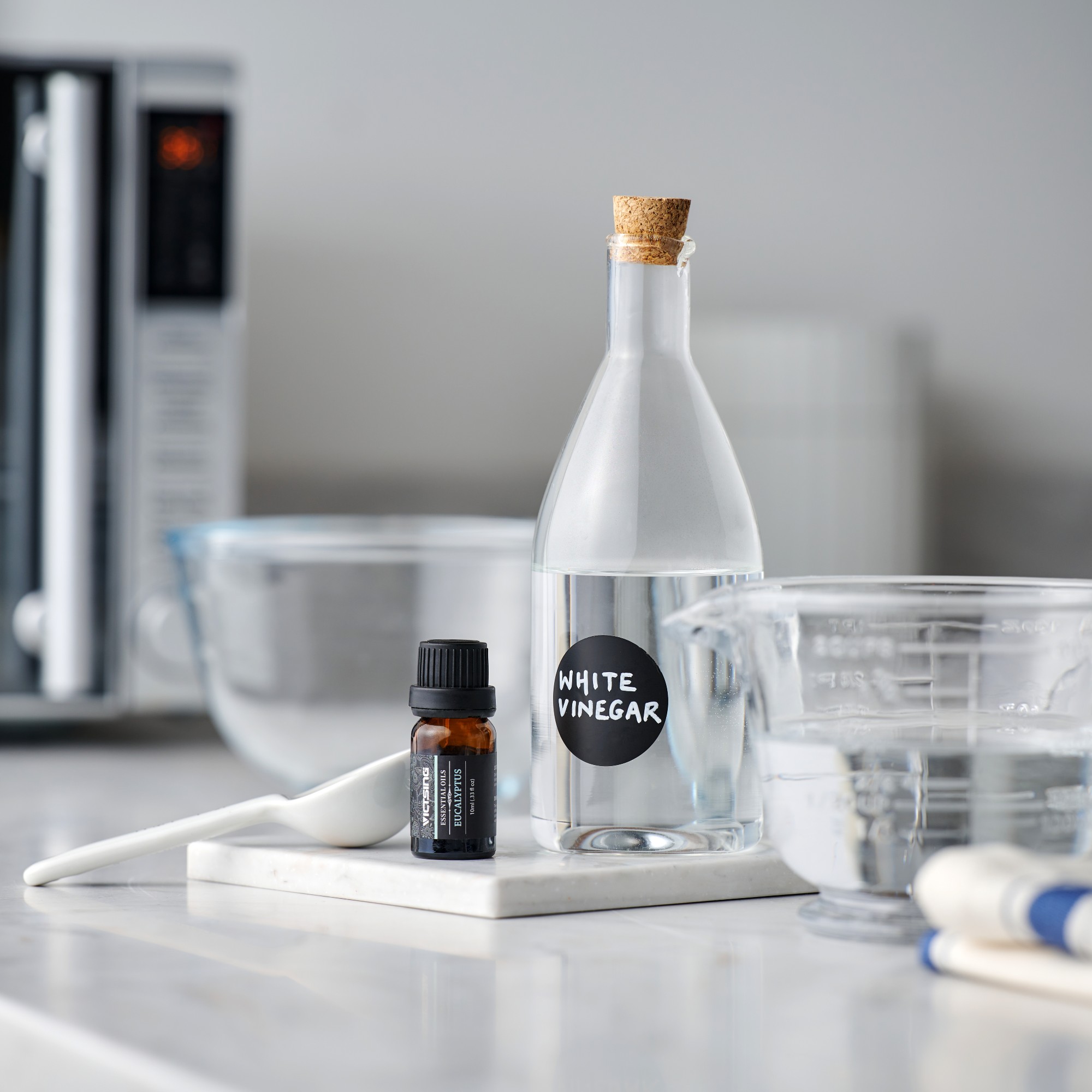
As an eco-friendly (and towel-friendly) alternative to fabric softener, the experts recommend using white vinegar. Cleaning with vinegar is a tried and tested method for many items, bath towels amongst them.
Learning how to clean towels with white vinegar is as simple as swapping it for laundry softener to keep towels soft and fresh. 'Softening your towels with white vinegar is a great way to ensure the soapy residue is broken down, which will prevent them from feeling rough and stiff,' Nancy Emery, cleaning expert at Drench explains.
'Simply wash your towels on a cycle of detergent and one cup of white vinegar in the tray and wash as normal. There’s no need to rinse the towels after the wash. Doing this once every few weeks will be enough to keep your towels soft for the foreseeable future. The vinegar will also help to clean your washing machine!'
8. Wash towels on a gentle cycle
The best temperature to wash towels will make a big difference in maintaining their condition. To keep cloth fibres strong, the experts recommend washing bath towels on a gentle cycle (no more than 40 degrees). Choose the warmest water appropriate for the fabric according to the care label.
'You may think that hotter temperatures are better for cleaning clothes, but towels are best washed in temperatures around 30-40 degrees,' says Nancy Emery.
'Warm water absorbs detergent better, in turn leaving less chemical build up on your towels, which makes them feel stiff. 30 or 40 degrees will eliminate most of your bacteria and preserve your towel fibres.'
'We recommend sticking to 30 degrees as towels don't need to be washed on a high temperature,' Laura from Seep eco tools agrees. 'This will help to extend the lifecycle of the towel as high temperatures can cause premature wear and tear as they’re too harsh for fabrics.'
9. Tumble dry
Once clean, remove your towels from the washing machine and shake them to breathe new life into the fibres. Dryer balls will decrease drying time and help soften fabrics naturally.
'You can dry towels in a tumble dryer but choose a low setting to protect the material. Adding a tennis ball to the dryer while the towel is inside will help to make them nice and fluffy', says Emily Barron, cleaning expert at Property Rescue.
...or air dry
Some experts recommend avoiding the tumble dryer altogether as even low heat can damage fibres. Instead, when the weather is fine, dry towels outside in natural daylight and shake them to fluff up before folding.
'Too much harsh heat can damage the cotton of your towels, which can be another reason why they feel hard. Line washing is the most environmentally friendly way to dry towels, so if you're drying them this way, you should shake the towels once they’ve dried to fluff them up,’ explains, Nancy Emery.
However, if you can't dry towels outdoors, there are other methods such as using a heated airer, or most of the best dehumidifiers feature a laundry drying function.
10. Fold and store
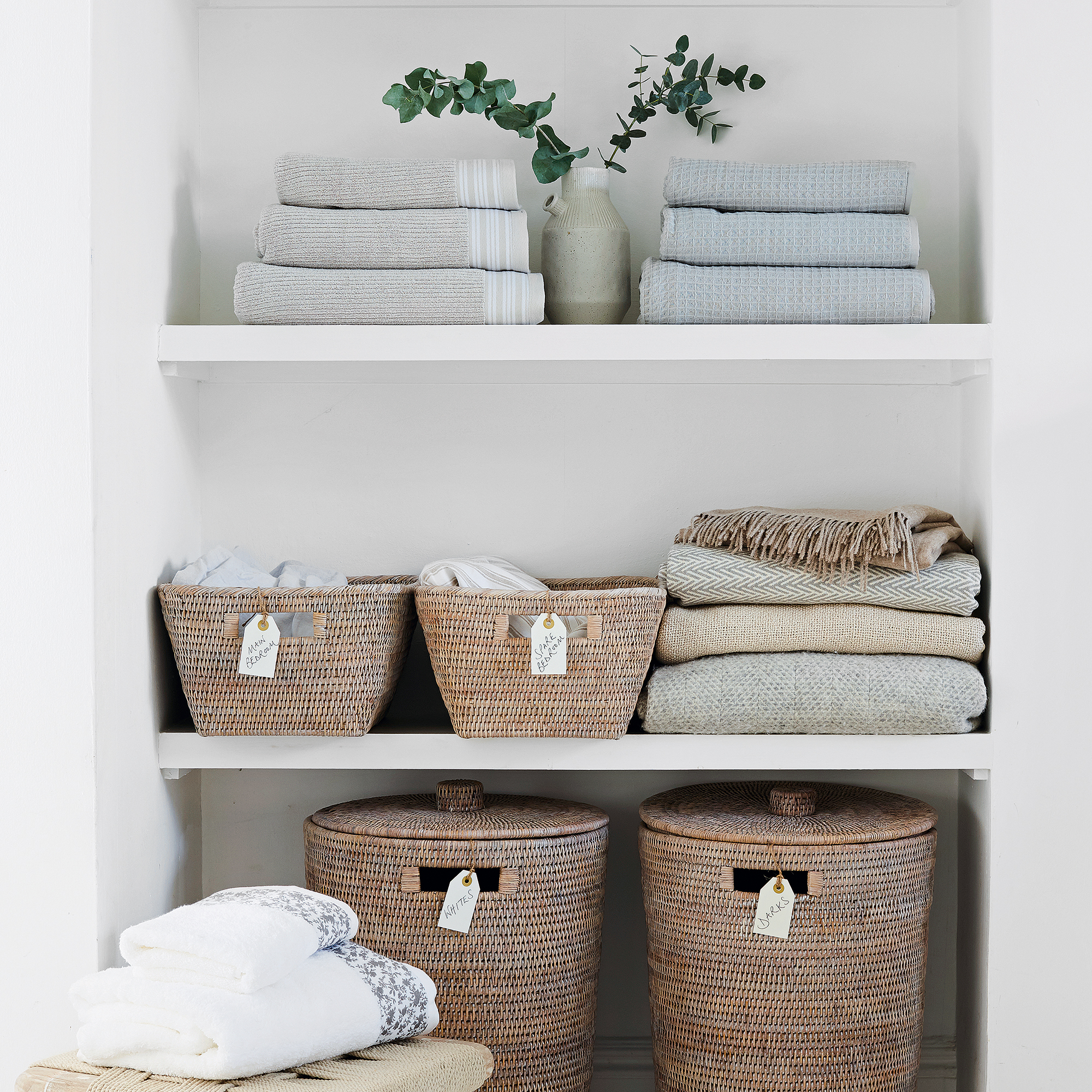
The final stage of knowing how to wash bath towels is using proper towel storage ideas that will help maintain their freshness. Before folding, shake to loosen the loops.
'Always shake your towels after they have dried to help loosen the threads. Shaking your towels will soften them, making them easier to fold,' continues Rachael Shah.
For best results, ensure towels are fully dry before folding and store them in a closed drawer or an organised linen cupboard out of the bathroom.
'Any towel that is damp when stored away could cause mildew and musty smells to form,' says Rachael Shah, Head of Sustainability at Linen Connect. 'Ensuring your towels are dry before storing them away will help to keep them smelling fresh.'
Avoid stacking freshly laundered bath towels on top of one another as this can flatten the fluffiness. 'Storing towels side by side instead of in stacks will ensure that the bottom towels aren't crushed by the ones above,' Nancy Emery adds.
You can also try towel rolling hacks as a neat way to display them.
Our current favourite bath towels
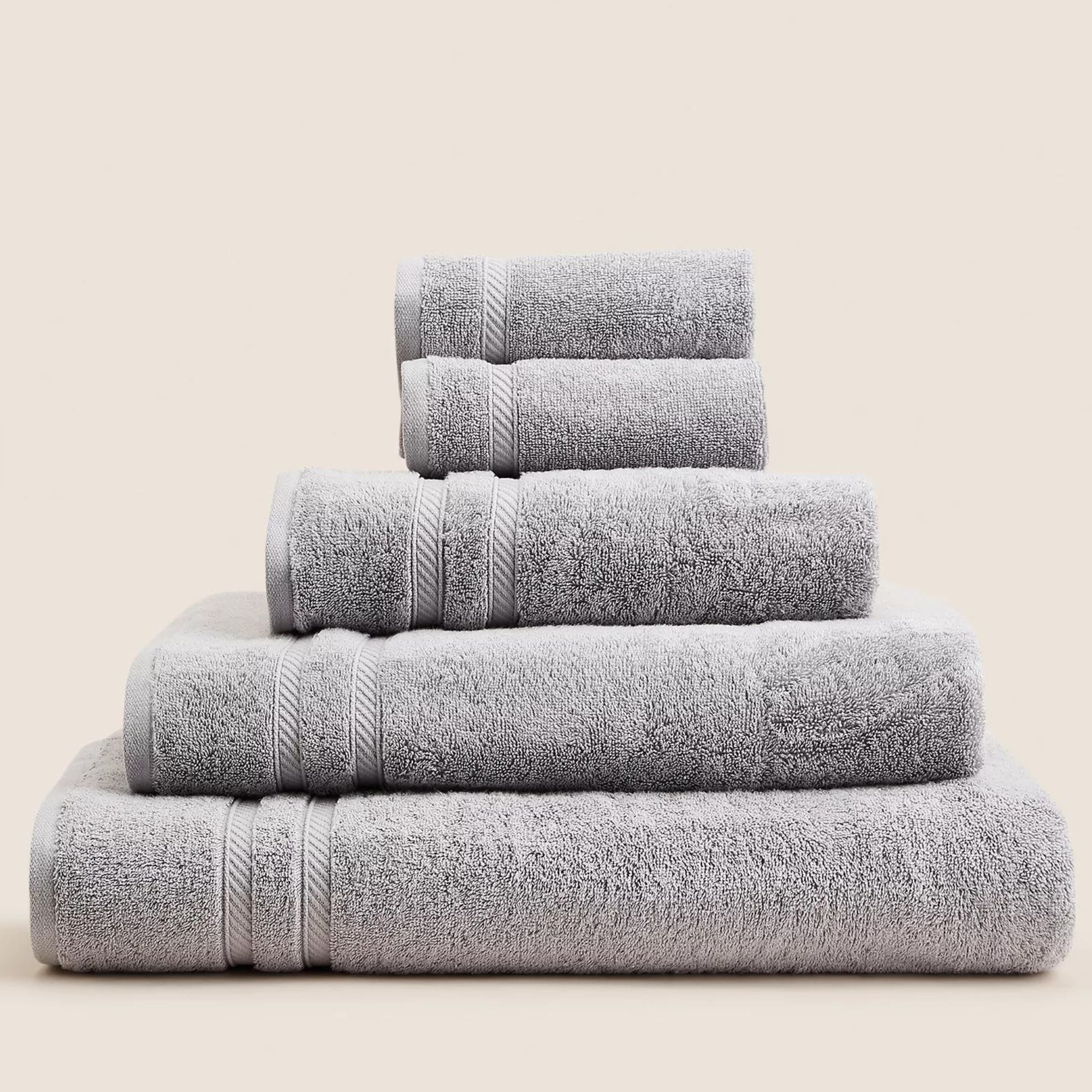
If you're looking to upgrade your bath towels, the M&S Luxury Egyptian Cotton Towels come highly recommended. Infused with Marks & Spencer's 'StayNEW™ technology' to keep them looking and feeling fresh after several washes, there's also 46 colours available - it would be difficult not to love these.
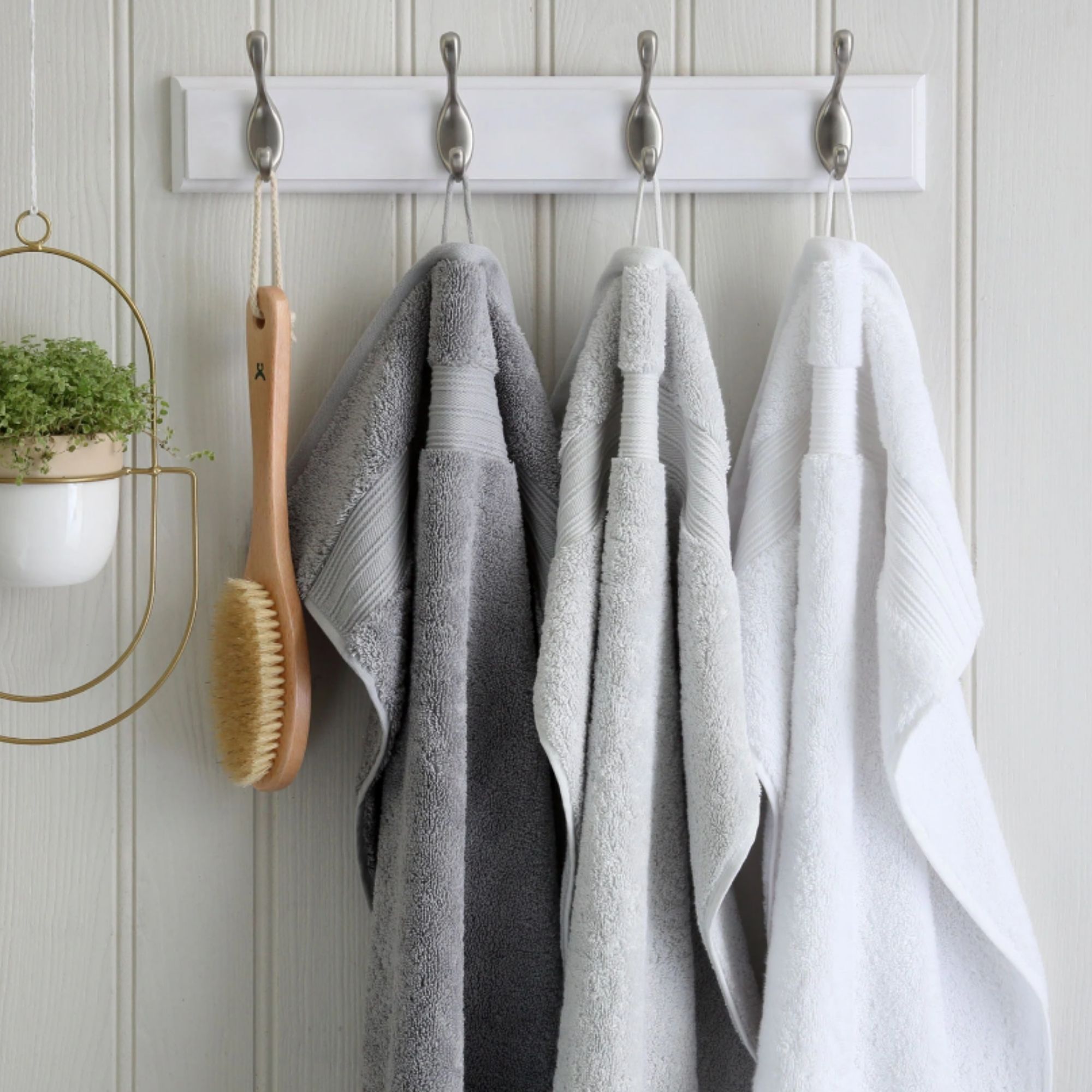
Our Sleep Editor Amy Lockwood was seriously impressed with the quality of Scoom's Egyptian Cotton Bath Sheets, describing them as 'thick, soft and wash brilliantly - mine still look like new after a year's use'. If you want to bring a touch of luxury to the bathroom, this is one of our top recommendations.
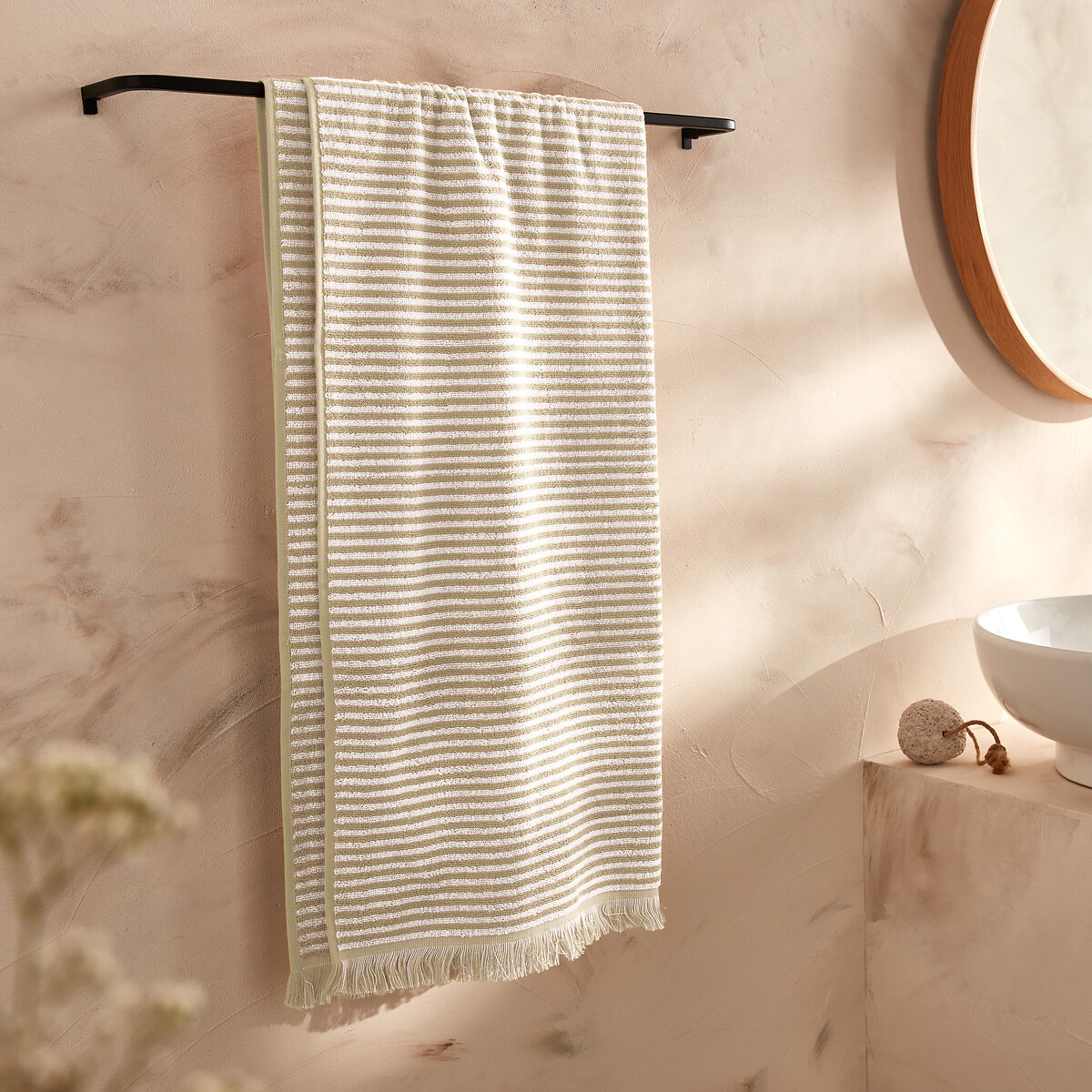
La Redoute is one of our go-to interior brands, and their bath towels don't disappoint. I love the beige striped version of this 100% Cotton Terry Bath Towel, but there's 7 patterns and colourways available in total. It's soft and washes easily, which is a big plus.
FAQs
How to get hard towels soft again?
There are a few things you can do to increase the softness of towels that have gone hard. First, skip the fabric softener as it coats the fabric and reduces absorbency. Instead, add a cup of white vinegar to the detergent drawer.
'The acidity of the vinegar cuts through the build up of soap and returns towels to their fluffy softness,' Laura Harnett from seep says. 'This only needs to be done every few washes as well, not each time.'
You should also use a gentle detergent and stick to a lower temperature wash cycle, like 30 degrees. Basically, less is more.
How do you deep clean bath towels?
White vinegar is a great option for deep cleaning bath towels. 'It is naturally antibacterial and acidic meaning it will remove sweat, oils, other stains and residue from shower gels and shampoo,' Emma explains.
To give your towels a real refresh, fill a sink or bath with plenty of warm water, and add one cup of white vinegar for every bucket of water used. 'Simply soak your towels for 30 minutes in the solution and then rub them between your hands to remove any marks or stains and ensure the liquid has fully penetrated the fabric,' Laura advises. 'They can then be squeezed to remove excess water and hung out to dry.'
This will tackle any lingering musty smells, as well as any stains. If the scent of vinegar is still on your towel afterwards, add some tea tree oil to your next wash load to eliminate this.
Now you know how to wash bath towels properly, you can look forward to being greeted by hotel-standard fluffiness after your next bath or shower.
Rachel Homer has been in the interiors publishing industry for over 15 years. Starting as a Style Assistant on Inspirations Magazine, she has since worked for some of the UK’s leading interiors magazines and websites. After starting a family, she moved from being a content editor at Idealhome.co.uk to be a digital freelancer and hasn’t looked back.
- Katie SimsContributor